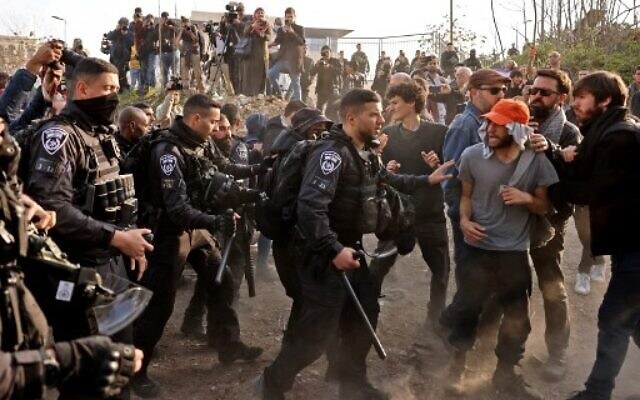
- ARAB NEWS
- 15 Jul 2025

Anyone interested in understanding the roots of the Palestinian-Israeli conflict need only visit East Jerusalem. There you can see all the major flashpoints. After four years of meticulous, exhaustive study, Amnesty International recently published a report showing that, in all areas under Israeli control, two very different systems exist: One that honors rights, equality and freedom for Israeli Jews; and one that denies rights, equality and freedom for Palestinian Arabs.
This racial discrimination is clear to see in Sheikh Jarrah. After the 1948 war, Palestinian refugees in this East Jerusalem neighborhood lived in squalid tents until the UN, cooperating with the Jordanian government, agreed to build homes for them. But since Israel occupied East Jerusalem in June 1967, it has honored undocumented claims by Jews who say that a particular plot of land belonged to their 19th-century ancestors, while denying Palestinians’ claims to homes and lands that their parents and grandparents were forced to flee during the heat of the war.
Making matters worse, Jewish settlers who have appointed themselves caretakers have increasingly succeeded in forcing Palestinian families from their homes, so that they can be turned over to Jewish families. These evictions, carried out with the help of the Israeli army, are clear violations of international law. When the Fourth Geneva Convention (on civilians) was drafted after the Second World War, its express purpose was to forbid precisely this kind of ethnic cleansing.
Not far from Sheikh Jarrah is another hot spot. In 2014, a US-sponsored agreement between Israeli Prime Minister Benjamin Netanyahu and King Abdullah of Jordan demarcated Islam’s third holiest mosque, Al-Aqsa, as a shrine where only Muslims may pray, but where all others may visit. Now, the agreement is being violated daily as Israeli security forces allow Jewish extremists to visit the site to pray — a highly charged act that threatens to turn a political conflict into a religious war.
The offense is so great that King Abdullah — the head of the Hashemite family, which maintains custodianship over Jerusalem’s Muslim holy sites — is yet to meet publicly with Israel’s current head of state, President Isaac Herzog, or Prime Minister Naftali Bennett (though he did meet both leaders secretly last year).
North, south and east of Sheikh Jarrah, Israel has built an eight-meter-high cement wall dividing Palestinian neighborhoods. It has provided separate roads for Jewish Israelis, while denying access to basic services for Palestinian residents, especially those living beyond the wall but under Israeli control. Some 100,000 Jerusalemites live in areas where Israeli services and security are absent, but Palestinian police are not permitted entry. In these legal twilight zones, violence, drugs and lawlessness are rife.
Israel’s discriminatory policies are not only violations of international law, they are also being implemented with brute force and intimidation. Owing to the tensions in Jerusalem, the Occupied Territories have become a battle zone where hooligan settlers routinely attack Palestinians, who can defend themselves only by throwing stones.
Israel’s discriminatory policies are not only violations of international law, they are also being implemented with brute force and intimidation.
Daoud Kuttab
Israel frequently prevents Palestinians from engaging in even peaceful political activity and events as innocent as a puppet show can be shut down if they are funded by or through the Ramallah-based Palestinian semi-government. Last April, the Palestinian leadership had to cancel a general election because Israel barred Palestinians in East Jerusalem from using post offices there to mail absentee ballots — an open refusal by Tel Aviv to honor its commitments under the Oslo Accords.
The deteriorating situation in Jerusalem and the daily clashes between illegal settlers and Palestinians across the Occupied Territories reflect the absence of any political horizon in the conflict. The Palestinian government is unable to intervene because it is too weak to confront the Israeli occupiers. Palestinians are left to resist the occupiers on their own, without any source of hope for the future.
Every avenue for a peaceful resolution of the conflict has been blocked by the Israeli government. Israel and its allies are doing precisely what they denounced the Arab world for doing after the 1967 Khartoum Arab League summit, in which leaders issued the “Three Nos” — no peace, no negotiations and no recognition of Israel. Bennett comes from a far-right, pro-settler party and has made it clear that he has no intention of holding talks with the Palestinians. He boasts about his refusal to even meet with Palestinian leader Mahmoud Abbas and he remains staunchly opposed to the two-state solution.
Jerusalem will always be a holy city for all three major monotheistic religions, and it remains the home of Palestinians and Israelis alike. But it has not served as the beacon of peace that many had hoped it would. Instead, it has become the center of the conflict. Without a serious effort to defuse the situation in Jerusalem and to provide political hope through a credible peace process, violence could easily spin out of control.